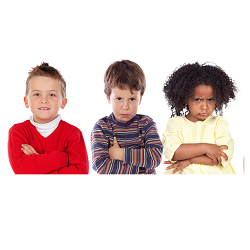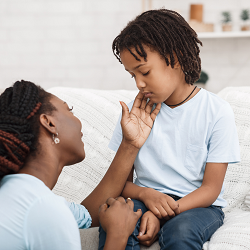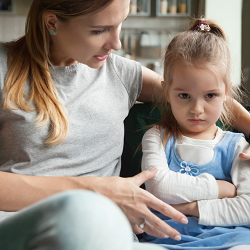As parents, if our child breaks a leg, has a sudden rash, or complains of unexplained aches and pains, we probably wouldn’t think twice about taking them to see a general practitioner. And although our mental and emotional well-being aren’t talked about as often or as openly as our physical well-being, for the health of ourselves and our children, it’s important that we learn to recognize signs of a mental health ailment, as well.
Growing up can be difficult and being a child or a teenager in today’s world has its own unique set of challenges. Bodies change, social dynamics are complicated, and there’s pressure to perform well academically as well as physically in sports and other competitions. On top of that, children today now face extreme pressure from social media to look and behave a certain way and are confronted with gender and sexuality questions that many of their parents never faced.
Consequently, as parents, knowing how to differentiate natural ups and downs in our children’s mental and emotional health from actual warning signs is critical. Sometimes, our children may simply need space and freedom to figure things out on their own and the best thing we can do for them is to show compassion, be patient, and listen as well and as often as possible. But, other times, children may need outside, professional help navigating their feelings and experiences. Plus, children often want someone other than a parent or family member to talk to, and seeing a therapist sooner rather than later can help resolve the issue in its earliest stages before it becomes a life-long issue.
15 Signs Your Child May Benefit From Therapy
-
Low self-esteem and self-worth, negative body image, or negative self-talk.
-
Exhibiting signs of an eating disorder.
-
Trauma of any kind – physical, emotional, or sexual.
-
Bullying, either as a perpetrator or a victim.
-
A parents’ divorce, separation, or other big changes such as a move.
-
The loss of a friend, family member, or loved one.
-
Suicidal talk or behavior of any kind.
-
Excessive worry or anxiety, not feeling good enough, always feeling behind.
-
A lack of friends, whether from the desire to self-isolate or an inability to resolve conflicts and communicate with others.
-
Drug or alcohol use, both of which can lead to severe mood swings.
-
Depression or a lack of excitement for life. This can look like staying up all night, sleeping all day, poor eating habits, no desire to exercise, and loss of interest in hobbies and activities your child use to enjoy.
-
Unexplained physical aches and pains, such as stomachaches and headaches.
-
Behavioral problems in school, causing disruptions, skipping class.
-
Physical violence of any kind.
-
You have a feeling that something is off. You know your child and can sense that something is going on that they may need help with.
If, at any point, you are concerned for the mental well-being of your child, begin by talking to them. Ask them how they are doing and if there is something specific they are going through. Be patient and expect that it may take them a few days, or even weeks, to open up to you. However, it’s also possible that you’ll be surprised at how willing they are to talk.
However, if your child is experiencing a mental health concern outside of your scope, a therapist is an excellent next resource. In therapy, children will talk, learn coping skills, practice acting out situations, receive praise, learn self-love, and learn patience and self-awareness. Your child will also learn to build emotional strength and resilience, as well as navigate whatever changes and challenges they are going through. Therapy can help children understand that they aren’t alone or “bad” or “wrong” for their feelings and that it’s completely ok and natural to feel big emotions. Therapy can also help your child develop communication tools and conflict resolution skills for their interactions and relationships with peers and other adults. For young children, play therapy can be particularly beneficial.
Our therapists at The Relationship Therapy Center undergo extensive training specifically for child and teen therapy. Our goal is to support your family, whatever that looks like, and we know that deciding if or when to take your child to therapy is an extremely personal decision. We are located in Roseville and Fair Oaks, Ca. and are here to answer any questions you might have. Contact us today to learn more.
Other Services offered at The Relationship Therapy Center in California:
In addition to child therapy treatment, Our Sacramento area counseling clinics located in Roseville and Fair Oaks, CA are pleased to offer a variety of mental health services. We will discuss the importance of self-care and emotional support to help you cope and to discover ways to find healthy ways of dealing with stress.
Child therapy treatment can be beneficial, with the right therapist. Our compassionate therapists are trained to walk you through the process and help you find healing and peace. Please contact our therapy office to learn more about the many ways we can help you and your loved ones heal, grow, and love healthy.




